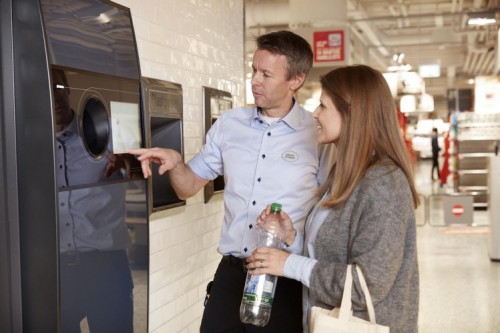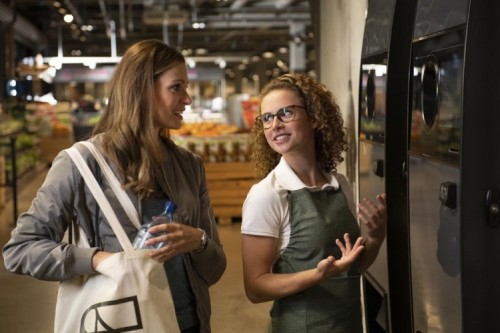TOMRA offers European retailers insights into reverse vending recycling at EuroShop
Early look at container deposit schemes and impact on plastic waste, at world’s largest retail trade fair in Dusseldorf on 16-20 February

European retailers can get ahead on retail involvement in future beverage container recycling programs, at the booth of global reverse vending leader TOMRA during EuroShop 2020. Regions such as Scotland, Portugal and England & Wales are set to introduce container deposit schemes in the next three years, and such schemes sometimes legislate the involvement of stores in receiving plastic bottles back for recycling. The European Union has also set out new goals for the collection of plastic bottles.
“Retailers curious about the role of supermarkets and other grocery stores in container recycling can get ahead of the pack at EuroShop, with early insight into upcoming requirements and the kind of programs and retail equipment that achieve those recycling goals,” explained Harald Henriksen, Head of TOMRA Collection Solutions.
What can container deposit schemes mean for retailers?
As well as local legislation already slated for the next three years, the Single-Use Plastics Directive adopted in 2019 by the Council of the European Union has set out for member states to collect 90% of all plastic bottles by 2029, with an interim goal of 77% by 2025. These goals seek to curb the alarming growth of plastic pollution worldwide, particularly marine litter.
Container deposit schemes are one way to achieve high return rates for plastic bottles. These schemes work by adding a small extra deposit on top of the price of a beverage, which is refunded to the consumer when they return the empty drink container for recycling. By incentivizing the return of containers, this gives the material a financial value and communicates its value for society. Existing container deposit schemes see up to 99% of all drink containers returned for recycling; no other waste collection systems reach such return rates.

Many markets worldwide have already adopted container deposit schemes, and often include “return-to-retail” legislation that requires stores selling beverage containers to also collect them for recycling after use. The world’s eight best-performing container deposit schemes employ return-to-retail collection, achieving an average return rate of 93%. Container deposit schemes without retail involvement average 77% returns, with some markets as low as 48%.
In a return-to-retail model, stores attract footfall from recyclers, and gain an opportunity to help recycle a retail product that can otherwise end up polluting streets, parks and oceans. Consumers benefit from a recycling location that’s convenient and already part of their routine. Consumers around the world are eager to be a part of the solution to the plastic waste challenge, with research in 15 countries showing that a median of 80% of the public are in favor of introducing deposit legislation. Container deposit schemes are an opportunity for retailers to engage with their customers on issues they care about.
To make the en masse return of containers more efficient for both consumers and stores, container deposit schemes often use “reverse vending machines” to analyze and sort containers when they are collected for recycling. These machines instantly count the number of containers returned, sort away ineligible containers, and pay out the correct deposit refund to recyclers – much faster than is possible through manual, human handling.

TOMRA operates more than 82,000 reverse vending installations, and receives over 40 billion containers for recycling annually. Seven of every 10 reverse vending solutions worldwide are produced by TOMRA. The company operates across more than 40 markets with container deposit schemes, and has worked with such schemes since it was founded in 1972.
Retailers visiting TOMRA at EuroShop can get ahead on container deposit and learn how to put recycling to work for their stores. They can hear first-hand experience of how container deposit schemes work, see a range of reverse vending solutions in action and try it out for themselves, discuss how installations can be tailored to individual retailers’ needs and store layouts, and find out how to build a great recycling experience for their customers. TOMRA's EuroShop booth is located in Hall 7A, at stand number B07. To arrange a commercial or media meeting, submit the booking form at tomra.com/euroshop2020.
Retailers visiting TOMRA’s booth can also hear from Clarissa Morawski, CEO of Reloop Platform, a European organization for circular economy policy advice. She will present the Single-Use Plastics Directive and the role of retailers, as part of the TOMRA Talks series on the future of recycling, on Wednesday 19 February. (Stay tuned to tomra.com/euroshop2020 for the full agenda.)
Contact [email protected] if you have any questions, need images or would like to arrange to speak to the TOMRA team.
About TOMRA Collection Solutions:
Founded in 1972, TOMRA provides reverse vending solutions for Clean Loop Recycling, collecting aluminium, plastic and glass beverage containers to be continually reused and recycled back into new bottles and cans. With over 82,000 installations across more than 60 markets, TOMRA’s reverse vending machines capture 40 billion used beverage containers every year toward a closed loop. This reduces reliance on raw materials, and ensures fewer containers end up in our streets, oceans and landfills. The TOMRA system of machines, digital solutions and service make it easy for the industry, system owners, retailers and consumers to contribute to a more sustainable planet. Visit our Reverse Vending pages on www.tomra.com, and follow us on Facebook, Twitter, Instagram and LinkedIn.
TOMRA Collection Solutions is part of the TOMRA Group, which creates sensor-based solutions for optimal resource productivity, and has a vision to lead the Resource Revolution. The Group employs approximately 4000 people globally and is publicly listed on the Oslo Stock Exchange (OSE: TOM).
